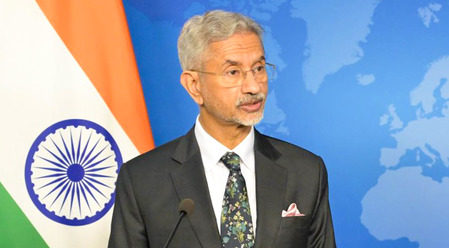
Brussels: The world needs to understand that the tensions between India and Pakistan are not merely a bilateral issue but a global concern about terrorism, External Affairs Minister (EAM) S. Jaishankar has highlighted during his ongoing trip to Europe.
“Let me remind you of something — there was a man named Osama bin Laden. Why did he, of all people, feel safe living for years in a Pakistani military town, right next to their equivalent of West Point (Pakistan military institution)? I want the world to understand that this isn’t merely an India-Pakistan issue. It’s about terrorism. And that very same terrorism will eventually come back to haunt you,” EAM Jaishankar said during an interview with European media outlet Euractiv in Brussels.
He warned that the terrorism targetting India right now will eventually haunt the rest of the world.
Responding to another question on India not joining sanctions against Russia and having not done enough to support Ukraine, Jaishankar said that India does not believe that differences can be resolved through war.
“We don’t believe that differences can be resolved through war — we don’t believe a solution will come from the battlefield. It’s not for us to prescribe what that solution should be. My point is, we’re not being prescriptive or judgemental — but we are also not uninvolved,” he said.
“We have a strong relationship with Ukraine as well — it’s not only about Russia. But every country, naturally, considers its own experience, history and interests. India has the longest-standing grievance — our borders were violated just months after independence, when Pakistan sent in invaders to Kashmir. And, the countries that were most supportive of that? Western countries,” the EAM said.
“If those same countries — who were evasive or reticent then — now say ‘let’s have a great conversation about international principles’, I think I’m justified in asking them to reflect on their own past,” Jaishankar further stated.
Highlighting how India sees itself in the new global order, EAM said that Europe has entered the era of multipolarity and now faces the need to make more decisions in its own interest — using its own capabilities and based on the relationships it fosters globally.
“I hear terms like ‘strategic autonomy’ being used in Europe — these were once part of our vocabulary. The EU is clearly a major pole in the global order — and increasingly an autonomous one. That is precisely why I’m here: to deepen our relationship in this multipolar world,” EAM mentioned.
